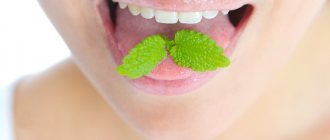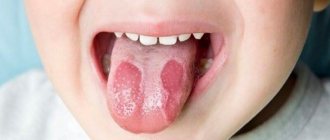Bad breath, which can become a constant companion of a person, can ruin relationships with others and reduce self-esteem. This condition is called halitosis, or halitosis. It is not an independent disease, but is one of the important symptoms of pathologies of the oral cavity and internal organs. You can drown out the stench with mints, spray or chewing gum, but this will not get rid of the problem. We need comprehensive diagnostic measures and subsequent elimination of the causes of halitosis.
Causes of bad breath
People who have never experienced ozostomy often consider the problem to be a consequence of insufficient cleanliness, which is most often completely untrue. In 90% of cases, the cause of halitosis (or halitosis) is bacteria that accumulate in the mouth. The result of their vital activity is sulfur components, which cause a sharp, unpleasant odor. The remaining 10% of cases are associated with diseases of the internal organs, medications or diet.
Types of halitosis
In order to eliminate the problem, you first need to recognize the enemy by sight. So, doctors distinguish several types of halitosis:
- physiological . Its cause is those same anaerobic microorganisms. Moreover, sometimes at a dentist’s appointment it is discovered that the patient’s teeth and gums are absolutely healthy, but the bad smell still persists;
- pathological _ The factors of its occurrence are diseases of the internal organs and clearly visible inflammation in the oral cavity;
- pseudohalitosis . In this case, we are not talking about a strong smell, and those around you do not experience discomfort when communicating. But the patient himself claims that he hears an unpleasant odor. This situation is often observed after successful treatment of osostomy, and is called pseudohalitosis.
Symptoms
Bad breath most often indicates internal problems. You can determine what exactly a person is sick with based on the complex of symptoms that appear. With hyperthyroidism, patients experience a constant feeling of hunger against the background of a sharp weight loss, tachycardia, and a tendency to depression.
You can suspect kidney problems by swelling on the face and frequent urination. Additionally, patients may notice dull spasms in the lumbar region. A characteristic symptom of diabetes is a constant feeling of thirst and pale skin. In children, the pathology is accompanied by other signs:
- increased fatigue;
- lethargy;
- peeling of the skin on the face and elbows.
The smell of ammonia from a child’s mouth may be associated with a lack of vitamin D in the body. In infants, a similar symptom should be associated with poor quality of mother’s milk. In order to identify progressive diseases in time, doctors advise showing the child to the doctor immediately when an alarming symptom appears.
How to find out for yourself if there is bad breath?
Of course, others will never tell the patient about such a delicate problem in an adult. Therefore, you can only rely on yourself in the initial diagnosis. It’s good that there are many simple ways to find out whether there is bad breath or not.
The simplest method is to clench your palm into a fist and breathe into it. Then bring your hand to your nose. Do you smell a strong smell? If so, it's time to make an appointment with your doctor! A small plastic spoon will also help detect the presence of odor. Use it to remove plaque on your tongue. After a minute, evaluate the smell. The same can be done with a napkin or cotton pad. True, this method is quite unpleasant to implement.
If using dental floss has long become a habit for you, do not rush to throw it away after use. It’s better to take a closer look: what color is it painted? Yellowness will indicate the presence of bacterial plaque, redness will indicate that the gums are bleeding. You can evaluate the smell of the thread 30 seconds after use. This is how others perceive your breathing.
Good toothpastes and chewing gums skillfully mask even the strongest odor. Therefore, the best time to test for fresh breath is 3 hours after brushing your teeth or eating chewing gum.
How can you tell if your breath smells?
Determining the freshness of your own breath is not at all easy. We adapt to the aromas that we smell all the time and stop noticing them. In addition, the oral cavity and nasopharynx are a single system, and this makes testing difficult. But there are several simple and visual ways to understand if there is a bad smell.
- Lick your wrist with the tip of your tongue and wait 15-20 seconds until the saliva dries. The scent left on the skin will give you some idea of the freshness of your breath. However, the tip of the tongue collects the smallest amount of bacteria, so the results will not be completely true.
- The main breeding ground for microflora that causes an unpleasant odor is located at the root of the tongue. Run your finger or a cotton swab in the area and smell: if the “sample” smells strong, there is a high chance that your breath may be spoiled too.
- Take a plastic cup, place it on your lips and release the air through your mouth. The smell inside the container will help determine if you are suffering from halitosis.
- Ask a loved one if he notices a specific “smell” when he communicates with you. Sometimes this is the most reliable way to find out the answer to a sensitive question.
Types of bad mouth odors
Sniffing, trying to catch the nuances of the stench is not a pleasant task. But this is the only way to understand which organ is sending the distress signal. Therefore, if the breath freshness test indicates a problem, think about what the smell resembles.
Putrid smell
Its appearance is provoked by bacteria living both in the oral cavity and in the gastrointestinal tract. In the process of processing food residues, microorganisms release waste products, the main component of which is sulfur compounds. This smell is usually very pungent and can be heard over a fairly long distance.
Rotten egg smell
The smell of rotten eggs or meat in 90% of cases causes advanced periodontitis or extensive carious cavities.
If the dentist does not find the problem, you should look for an answer in the gastroenterologist’s office. It is likely that an unpleasant odor is a signal of a malfunction in the digestive system. Sometimes in this way the body informs its owner about excessive consumption of protein foods. During its breakdown, hydrogen sulfide is formed, which has an odor reminiscent of rotten eggs.
Sour smell
The appearance of an acidic smell may indicate a number of unpleasant pathologies. This is exactly what gastritis, duodenal ulcers and chalazia (esophageal insufficiency) “smell” like. If bad breath is accompanied by heartburn and frequent sour belching, you should visit a gastroenterologist: the examination will certainly reveal problems of the gastrointestinal tract.
Smell of acetone
In adults, it is an invariable companion to diabetes mellitus. May indicate poor functioning of the liver, kidneys and thyroid gland. Sometimes the smell of acetone appears during severe acute respiratory diseases. And almost always when fasting and following low-carb diets. In the latter case, you just need to reduce the consumption of protein and too fatty foods, and the smell will go away.
A special case is the smell of acetone from a child’s mouth. The mother of every 5 baby has encountered it at least once. Acetonemic syndrome is a life-threatening condition that occurs against the background of infections, overwork, and after overeating. It requires immediate medical intervention!
Ammonia smell
Ammonia odor is often caused by taking medications containing amino acids. Sometimes it can even be vitamins. Another common cause is a low-carbohydrate diet, which causes the liver and kidneys to work at their limit. In this case, increasing the amount of fluid you drink, preferably water, can improve the situation.
If you are not fasting, drinking enough fluids, and the smell of ammonia from your breath still haunts you, this is a reason to undergo a comprehensive examination. The cause of the unpleasant odor may be diabetes and kidney disease.
Stool smell
Perhaps the most unpleasant is fecal odor from the mouth. Neither the patient himself nor those around him can ignore it. If this is your first time encountering such a problem, remember whether you had wild garlic, onions or garlic on your table. These products can create real hell for those around you.
If several days have passed after consuming them and the smell remains, you should sound the alarm. The smell of feces from the mouth may be the first symptom of diseases of the nasopharynx and upper respiratory tract, tuberculosis, and disorders of the salivary glands. This is the smell that can be heard from experienced smokers and people who abuse alcohol.
Only a doctor can identify the exact cause of the problem. And sometimes, to eliminate bad breath, you will need to undergo a full examination.
20% discount on removing bad breath!
Moscow
Treatment of digestive diseases
If the oral cavity is sanitized, but the smell remains, you need to contact a gastroenterologist. Before treating halitosis, an examination will be carried out to find the cause of the disorders. Gastritis and ulcers are associated with poor diet, but inflammation of the gastric mucosa is supported by Helicobacter bacteria. You need to get rid of them comprehensively.
To do this, the doctor will prescribe the following groups of medications:
- antacids – to reduce acidity;
- antibiotics – drugs to kill bacteria;
- healing agents - bismuth nitrate or De-nol to restore the mucous membrane.
In the treatment of cardiac sphincter insufficiency, when the opening between the esophagus and the stomach does not close, antacids are also used, supplemented with prokinetics that improve peristalsis. Treatment of digestive diseases is impossible without following a special diet.
What diseases cause bad breath?
Trying to diagnose yourself is a thankless task; the range of diseases that can manifest themselves through bad breath is too wide.
Dental diseases
This is the first thing that comes to the mind of a person who has once discovered a problem. Indeed, the most common cause of a pungent odor is caries. Food debris accumulates in carious cavities and pathogenic bacteria multiply. Inflammation of the soft tissues of the oral cavity will also be a real gift for such microorganisms:
- gingivitis;
- periodontal disease;
- periodontitis.
Those patients who periodically turn to dentists for teeth cleaning know that removing tartar is always accompanied by an unpleasant odor. The rest do not even suspect that entire colonies of bacteria accumulate in the interdental space.
Harmless, at first glance, plaque slowly but surely turns into tartar, which not only causes an undesirable odor, but also creates periodontal pockets. Gradually going deeper, they expose the roots of the teeth. The teeth themselves become loose and subsequently fall out.
To avoid such a scenario, preventive visits to the dentist should become the norm for every patient. And if you have bad breath, you should not postpone your visit to the dental center for more than a few days. If the doctor does not identify problems with teeth and gums, you will have to look for the cause of halitosis from other specialists.
Diabetes
If the teeth are healthy and the breath smells of acetone, the therapist will immediately refer the patient to an endocrinologist, because this is how diabetes mellitus usually begins to manifest itself. With this pathology, glucose does not enter the body's cells, but accumulates in the blood. The cells, in turn, feel energy hunger. To saturate them, the body rapidly breaks down fats and proteins, which leads to the production of acetone.
The diagnosis can be confirmed by a urine and blood test, which will certainly contain ketone bodies. Ignoring the smell of acetone on your breath can lead to hyperglycemic coma and even death.
Liver and gallbladder diseases
Gallstones, cholecystitis and bile stagnation make themselves felt by the appearance of bad breath. Usually in this case the smell is not so strong that the patient pays attention to it. He is much more worried about the bitter, unpleasant taste in his mouth, as well as pain in the right hypochondrium, often radiating to the back.
However, the “liver” smell is easy to recognize: it is sweetish, and somewhat reminiscent of the smell of raw liver. When it becomes putrid, the organ has ceased to cope with its functions, and it is likely that the patient will be diagnosed with hepatitis or cirrhosis. To establish a diagnosis, an ultrasound must be performed and a blood test taken for bilirubin and liver enzymes.
Thyroid
An unpleasant odor may also appear due to disturbances in the functioning of the thyroid gland. An increase or decrease in its functions is observed in 2% of the population of our planet. Diseases of this organ begin almost imperceptibly and proceed without any special manifestations. One of the first alarm bells is the smell of iodine coming from your mouth.
Kidney diseases
You can suspect problems with the kidneys by bad breath, which clearly resembles urine. In this case, we can talk about a violation of protein metabolism. Metabolism is disrupted, and the end products of protein breakdown are excreted through the lungs. The ammonia odor is intense, although no toxins are detected in the exhaled air.
Gastrointestinal problems
Accompanied by heartburn, belching and pain in the epigastric region, an unpleasant sour breath almost always indicates diseases such as gastritis or a stomach ulcer. Problems with the intestines are also possible, for example, dysbiosis (disturbance of the microflora), which often occurs while taking antibiotics and other medications.
Pathology of the respiratory system
A putrid odor can be caused by diseases of the respiratory system such as:
- enlarged adenoids;
- tonsillitis;
- chronic sinusitis;
- angina;
- sinus inflammation;
- bronchitis;
- purulent otitis;
- pneumonia.
An unpleasant odor indicates that an inflammatory process is in full swing in the body, which requires urgent medical attention.
Important! Regardless of the cause of bad breath, once the disease that caused the symptom is completely cured, it completely disappears. This is why it is so important to determine the cause of halitosis, and not try to mask the problem with air fresheners.
Diagnostics
With the problem of bad breath, patients usually turn to a dentist or gastroenterologist. The doctor conducts a diagnostic complex according to his profile, and, if necessary, prescribes consultations with related specialists. To detect many dental diseases, a visual examination of the oral cavity is sufficient. For halitosis, the following laboratory and instrumental methods are used:
- ENT examination.
Standard examinations are performed - anterior and posterior rhinoscopy, pharyngoscopy, indirect laryngoscopy. During the examination, the doctor takes a swab from the throat and nose for analysis. If there are changes in the tonsils, it is necessary to carry out bacteriological culture of the plaque. - X-ray examination.
An orthopantomogram is recommended for dental diseases to assess the extent of the process. X-ray examination of the gastrointestinal tract with contrast is informative in the diagnosis of ulcers, diverticula, and neoplasms. X-ray of the paranasal sinuses is a method of confirming sinusitis. - Endoscopic methods
. EGD is used for suspected chronic gastritis. Upon examination, hyperemia of the gastric mucosa, the presence of erosions, and impaired tone of the cardiac and pyloric sphincter are determined. Bronchoscopy is necessary to confirm bronchiectasis. - Analyzes
. A hemogram is prescribed to quickly identify signs of an inflammatory process. A biochemical blood test can detect dysproteinemia, increased creatinine and urea levels, and cytolysis syndrome. When assessing coprograms, attention is paid to the amount of neutral fats and undigested muscle fibers.
Unpleasant smell in the morning
During sleep, all processes in the body, if they do not freeze, then occur much more slowly than during wakefulness. This also applies to the work of the glands responsible for the production of saliva. But this process is one of the most important factors in the fight against bad breath.
During sleep, the volume of saliva production decreases significantly. It becomes insufficient to protect teeth and gums from pathogenic bacteria. As a result, after a few hours of sleep, the concentration of microorganisms increases several times, and their waste products create a not very pleasant odor.
The human oral cavity is home to a huge variety of bacteria. Depending on the species, they can cause the smell of cadaverine and hydrogen sulfide, methyl mercaptan and putrescine. In other words, during the night a whole “bouquet” of terrifying aromas accumulates in the mouth, which makes morning kisses far from the most romantic.
Poor nutrition
If the appearance of an odor is inconsistent, and a person associates what is happening with changes in diet - a change in diet, strict diets, irregular meals - it is necessary to normalize the menu and include foods containing fiber in the diet. High-protein diets help you quickly lose weight and reduce subcutaneous fat, but they are harmful to health; the breakdown products of proteins and fats poison the body.
Green vegetables and herbal teas will help reduce the negative impact. Increase the amount of “greens” in each meal, be sure to drink plenty of clean water without carbon or green tea. This will not increase the calorie content of food and will help the internal organs deal with toxins faster.
Instead of exhausting diets, it is better to give preference to active sports - cardio, strength training and gymnastics. Sport promotes weight loss better than any strict diet, makes the body strong and fit, preserves and improves immunity, which cannot be said about fasting.
Long-term abstinence from eating contributes to the development of a number of diseases. An ammonia taste is the first warning sign of poor nutrition.
Other causes of unpleasant odor
In addition to the reasons already listed, strong breath can be caused by:
- Poor nutrition
. Namely, consuming large quantities of dairy and meat products. Such a diet radically changes the acid-base balance, which serves as a favorable environment for the development of microorganisms that cause an unpleasant odor. You can reduce its intensity by simply adding foods containing carbohydrates to your diet. - Hormonal disbalance
. Any hormonal “swing” immediately affects the quality of saliva. It becomes more viscous, loses oxygen, which in turn contributes to the appearance of stench. - Smoking
. Fans of this addiction should know that the mucous membrane of their oral cavity becomes dry. And with dry mouth comes an unpleasant odor. - Poor quality hygiene products
. Incorrectly selected brushes or pastes can also be the culprit of the problem. The ideal choice is maneuverable brushes with normal stiffness and a mobile head. - Insufficient oral care
. The process of brushing your teeth should occur at least twice a day: in the morning and before bed. - Dentures, veneers, crowns, and even piercings
can also become activators of bad breath. All these items require careful care, as bacterial plaque and food debris constantly accumulate around them and under them.
Treatment methods
How halitosis is treated depends directly on the cause that caused the unpleasant odor. The dentist will provide a comprehensive solution to the oral problems that could cause this problem. But if the treatment does not help, he will refer you to another specialist for further examination.
Professional oral hygiene This procedure involves removing plaque and tartar, including those located deep under the gums. An integrated approach is used, i.e. Several devices are used at once: ultrasonic, air-abrasive Air Flow, if necessary, manual cleaning is carried out. Finally, the enamel is polished and coated with a protective fluoride varnish.
Price:
3000 rubles more about the solution
Treatment of caries If there is caries on the teeth, the inflamed tissue will be removed, the resulting cavity will be treated with antiseptic, followed by filling using composite materials. When the carious process penetrates into the deep layers, it is advisable to use medicated pads containing calcium hydroxide - this way additional protection is created to preserve the dental nerve.
Price:
3000 rubles more about the solution
Treatment of bad breath
Osostomy is a serious problem that requires an integrated approach. Therefore, do not be surprised if your dentist recommends using several treatment methods at once:
- Scrapers
. There is nothing much more effective than constantly cleaning the surface of the tongue. Ideally, after every meal. This will help significantly reduce the number of bacteria growing in your mouth. - Rinse aids
. They deal with bacteria much more effectively than chewing gum. But to feel the effect, you need to rinse your mouth for at least 30 seconds. - Toothpastes and gels
. A properly selected toothpaste or gel for cleaning teeth is already half the guarantee of getting rid of odor. - Toothpicks.
The systematic use of these sticks helps to get rid of food particles stuck in the interdental space. - Toothbrushes
. Dentists all over the world recommend using ultrasonic brushes, whose bristles are capable of cleaning the most inaccessible places. - Flosses
. Dental floss is becoming increasingly popular. This is an excellent tool for cleaning the interdental space, which leaves no chance for bacteria.
All of the above methods will be effective only in one case: if there are no teeth damaged by caries in the oral cavity, and the gums are healthy. Therefore, the first thing to do if an unpleasant odor occurs is to undergo complete dental treatment.
Treatment
Help before diagnosis
Lifestyle, nutrition and hygiene skills play a major role in the treatment of halitosis. To eliminate the physiological causes of unpleasant odor, you need to brush your teeth 2 times a day for at least 3 minutes, and do not forget to clean your tongue of plaque. For oral hygiene, it is necessary to use dental floss and refreshing rinses. To quickly freshen your breath, you can use sugar-free chewing gum.
You need to reduce your consumption of garlic and onions, reduce the amount of spicy meat dishes and red wine. It is advisable to limit your daily coffee consumption to 1-2 cups. Available foods to freshen your breath include apples, carrots, green leafy vegetables. Doctors advise giving up smoking, since the unpleasant smell of cigarette tar cannot be eliminated by any means.
Conservative therapy
If halitosis occurs against the background of drug-induced xerostomia, it is necessary to discontinue or reduce the dose of drugs. There are no specific medications to eliminate unpleasant odor from the mouth. Therefore, therapy comes down to getting rid of its cause. Most often, a person requires qualified dental care. After sanitation of the oral cavity, halitosis disappears.
For gastrointestinal diseases, not only etiotropic treatment is carried out, but also the use of enzyme preparations. Enzyme replacement therapy normalizes digestive processes, eliminates stagnation and fermentation of food. Thanks to this, your breath becomes fresh. For ENT diseases, etiopathogenetic therapy is selected. Emergency conditions are treated in intensive care units.
Treatment of halitophobia is primarily aimed at normalizing the patient’s psycho-emotional state. Psychotherapy sessions are recommended, mild sedatives and tranquilizers are used. People with apparent halitosis are prescribed general measures: careful care of the mouth and teeth, monitoring diet, limiting alcohol consumption.
Folk remedies
Traditional medicine can also cure halitosis. Moreover, in her arsenal there are no fewer tools than a dentist can offer. Thus, rinsing the mouth with water and adding a few drops of propolis tincture gives good results. For the same purpose, you can use an infusion of dried apricots, mint or strawberries.
It is quite effective to consume anise seeds daily on an empty stomach. And if you couldn’t find them, you can easily replace the anise seeds with two apples. The main thing is to rinse your mouth with warm water first.
After each meal, it is useful to eat half a teaspoon of grated ginger. But this recipe is not suitable for those patients who suffer from gastrointestinal diseases. In this case, it is better to simply chew or eat a couple of basil leaves. If bad breath is caused by sinusitis, traditional medicine recommends moistening cotton balls with celandine infusion and inserting them into the nostrils for 10 minutes. It will also be useful to replace store-bought rinses with decoctions of chamomile, sage or calendula.
Treatment options
It is important to carry out periodontal treatment in a timely manner in order to prevent pathologies of the periodontal tissues. Healthy bone tissue, gums, and ligaments are the key to oral health. It is imperative to respond to such a signal as bad breath. By consulting a doctor, you can identify the exact cause of the disease. Diseases of the gastrointestinal tract, kidneys, and thyroid gland are treated by specialized specialists. Dental problems are solved by a dentist.
The ammonia smell, which is temporary, can be eliminated as follows:
- Drinking plenty of water;
- Cleaning your tongue and teeth;
- Adding carbohydrates to the menu;
Serious illnesses, such as diabetic ketoacidosis, are treated in a hospital. The patient is given insulin to save him from a coma.
Treatment in the clinic
Modern methods of dental treatment make it possible to achieve good results. The sooner the patient seeks help, the easier and faster the therapy will be. In addition to eliminating the underlying disease, treatment of bad breath is carried out with hexoral. The substance can inhibit many bacteria. Miramistin is widely used among bactericidal drugs. It fights gram-positive and negative microorganisms. They wash the bladder. A universal remedy is stopangin, which destroys bacteria, fungi, and infections. The drugs are prescribed by the attending physician.
Folk remedies
If your breath smells like ammonia, you can get rid of it after eliminating the disease. To freshen your breath:
- Changes in diet should be made.
- Rinse your mouth with a decoction of oak bark, chamomile, sage, and mint.
- You can use vegetable oil to rinse and then spit it out.
- Hydrogen peroxide and water are often used. The product kills bacteria and refreshes the oral cavity.
- Coffee beans quickly eliminate bad breath. You need to chew it, holding it in your mouth for a few minutes.
The patient should avoid excessive consumption of protein foods, alcohol-containing drinks, and tobacco.
Prevention
The best prevention of halitosis is following all the rules of hygiene: choosing the right brush and toothpaste, brushing your teeth and tongue twice a day, using floss and rinses, and regular visits to the dentist. In addition to these procedures, it is important to ensure that the diet is balanced and the intake of fluid into the body is sufficient.
Which doctor should I contact?
If an unpleasant odor appears, the first step should be a visit to the dentist. This doctor will be able to help in the vast majority of cases. If no problem is detected, it is the turn of a nutritionist and gastroenterologist. Most likely, in this case, you will have to take additional blood and urine tests. Depending on the results obtained, a specific specialist will treat the problem: for problems with the thyroid gland - an endocrinologist, for kidney diseases - a urologist, for pathologies of the respiratory system - an ENT specialist or a pulmonologist.
You can get rid of an unpleasant odor only by establishing an accurate diagnosis. Therefore, if the problem persists longer than 2-3 days, it’s time to start an examination!
Author: Elena Kopylova Dentist-therapist, endodontist. Work experience more than 8 years.
The information is for reference only. Before treatment, consultation with a doctor is necessary.
What do different types of smell mean?
Unpleasant odors are caused by several types of volatile compounds produced by anaerobic bacteria. They use food debris on the tongue, between teeth and in carious cavities as a nutrient medium. Depending on the predominant compound, the character of the odor changes. Some of them suggest the pathology that caused halitosis:
- sour aroma – stomach diseases, gastritis or ulcers;
- feces, rotten cabbage - oral pathology, caries;
- smell of urine - kidney failure;
- the smell of ammonia or rotting apples – diabetes;
- rot, rotten meat - esophageal diverticulum.
You can find additional symptoms that will accurately indicate the cause of halitosis. If you have stomach pathology, you will experience pain between snacks. Diabetes mellitus is accompanied by excessive urination, dry mouth and thirst. Caries may not appear for a long time, but in advanced forms toothache appears.
Given the variety of causes, diagnosis, prevention and treatment of halitosis can be performed by doctors of different specialties. You need to see a dentist to get rid of dental diseases, but in other cases you will need to consult an endocrinologist, therapist or nephrologist.









